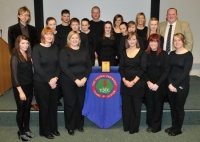Young Farmers' Clubs of Ulster
There he had a distinguished academic career and gained renown as a debater, being elected President of the Union in 1907, a much coveted position which is supposed to open the way to a Westminster seat and early elevation to cabinet rank.After his return to London in 1922, Armour received word that his father was very ill. What happened next he recorded in his book, Facing The Irish Question: He obtained the position of reporter, but after six weeks was elevated to become 'Writer of Special Articles' and in 1928 took over the editorship.Even as editor, special articles remained his penchant and under the initials 'WA' he wrote on subjects ranging from political controversy, to all sorts of educational matters and accounts of people and places from his world travels, to investigation of social problems in Northern Ireland and suggestions for their improvement.He felt clubs should be open to all young people under the age of twenty and he favoured the idea, used in England, that each member should be encouraged to either own livestock or to interest him or herself in a garden or allotment.He said one of the most promising features of the YFC movement was that it provided a practical and popular starting point from which other activities for the benefit of the young people could be developed.Combined with the youth led nature of the Association at all levels, a wide range of activities and events, relevant to the needs and interests of rural young people, is organised every year.[7] The YFCU has been represented by a number of members at events and conferences held by the Association's sister organisations in Scotland, Wales, England and the Republic of Ireland.Loxton retired in March 1948 and was succeeded b Arthur McAlister, who used his considerable literary ability to good effect as editor for the next sixteen years.Its main aim is to showcase the events and activities that YFCU organises, and to inform the membership of news from other clubs and the Northern Ireland agricultural industry as a whole.


charityAgriculturefarmingnon-politicalnon-sectariancooperationAntrim RoadBelfastNorthern IrelandeducationUlster Farmers' UnionMacra na FeirmeLimavadyInner TempleFirst World WarAllahabadThe Northern WhigCounty AntrimCounty ArmaghCounty DownCounty FermanaghCounty LondonderryCounty TyroneAhoghillBlearyDerrygonnellyCity of DerryCappaghCrumlinColeraineCastlecaulfieldFinvoyMountnorrisCurraghClanaboganNewtownhamiltonBallywalterLisbellawDungivenCookstownDonaghadeeLisnaskeaGarvaghHillhallKilreaNewtownstewartHillsboroughMoneymoreSeskinoreKillinchyStrabaneMoneyreaTrillickLylehillNewtownardsMilebushRathfrilandRandalstownStraidThe Glensagricultural industryUnited Dairy FarmersUlster Farmers UnionNew Zealand Young Farmers